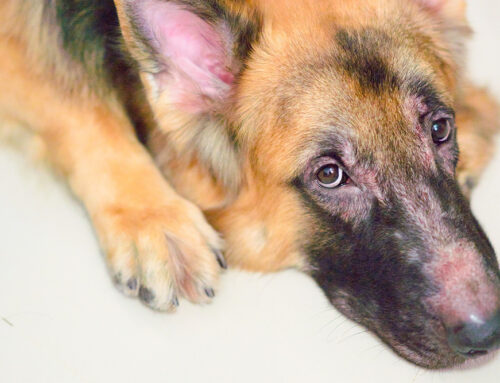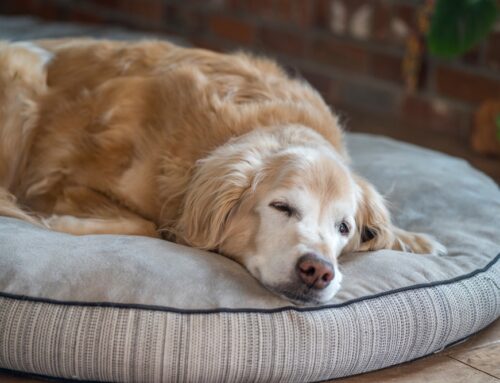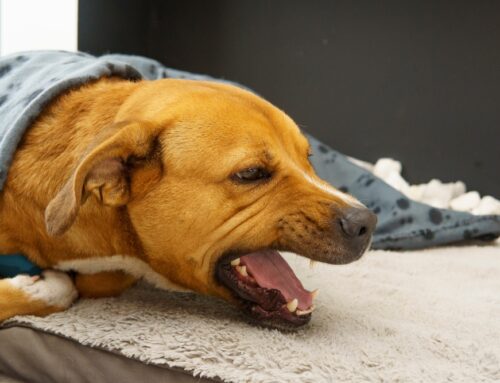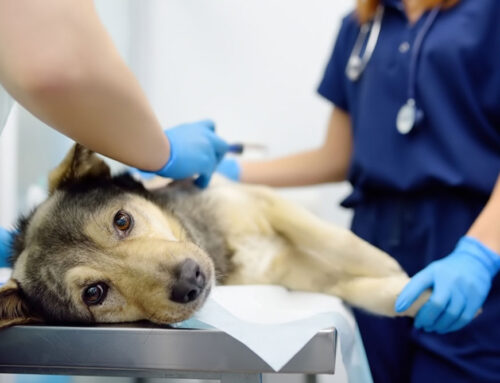July Fourth is a time for celebration, but the holiday can also be stressful and dangerous for pets who have a fireworks phobia, run away out of fear, or experience other holiday mishaps. To learn about the many hazards this holiday can present to your furry pal, read our Southern Crossing Animal Hospital team’s tips for keeping pets safe and comfortable during July Fourth festivities.
#1: Create a safe haven for your pet
Loud noises, bright lights, and crowded parties are enough to send any pet into a panic. Fireworks anxiety is a common noise phobia manifestation, which occurs in up to two-thirds of dogs. To help your pet cope during July Fourth festivities, create a safe and quiet space indoors where they can retreat—preferably in a house area insulated from outside noise. Close the curtains to minimize stimuli and use white noise or calming music to drown out the fireworks’ booms.
#2: Distract your pet to keep them calm
Pets with mild fireworks anxiety can be distracted with high-value chews, puzzles, or toys to keep them mentally stimulated and physically occupied. You can also engage them in indoor training sessions or playtime to redirect their focus and help them stay calm, although this is unlikely to work for pets with severe phobias.
#3: Consider anxiety medication if your pet has a severe noise phobia
A pet with a severe fireworks or noise phobia becomes anxious during a noise event. The signs include drooling, panting, pacing, vocalizing, clinging to their owner, hiding, panicking, and attempting to escape. If your pet has exhibited any of these signs before, speak with our veterinary team about using anti-anxiety medications or supplements to help your furry pal cope and reduce their injury risk or prevent them from running away. If your pet’s noise aversion is extremely severe, look into working with a professional trainer to try and desensitize your furry pal to their noise trigger.
#4: Provide identification to avoid losing your pet if they run away
Fireworks displays’ noise and commotion make July a common time for pets to run away as they attempt to escape from the perceived danger. By having your pet microchipped and ensuring the registration information is up to date, you provide your pet with permanent identification if they run away. You should also ensure your pet always wears a collar that includes identification information and rabies tags.
#5: Avoid feeding your pet holiday foods
Many traditional barbecue food remnants, including rib and chicken bones, and corncobs, can harm pets by causing intestinal blockages or lacerations. In addition, other foods can be toxic, including alcoholic beverages, chocolate, grapes, garlic, onions, and baked goods containing xylitol. Avoid feeding pets scraps and ask guests to throw away their food remnants as soon as they are done eating.
#6: Protect your pet from excessive heat
July Fourth often coincides with high summer temperatures and humidity, which can lead to heatstroke in susceptible pets. Brachycephalic—flat-faced—breeds, such as bulldogs and pugs, are at a greater heat-related illness risk than other breeds and should be kept inside during the hottest parts of the day. Ensure any pet who is allowed outdoors to mingle with guests has access to shade and cool water.
#7: Practice fireworks safety to avoid a pet injury
If you can’t resist setting off fireworks at home, which we do not recommend if you have an anxious pet, move as far away as possible from structures and main yard areas. Keep pets indoors to prevent them from running away or attempting to chase the fireworks. Afterward, thoroughly clean up debris and promptly remove spent fireworks to prevent pets from ingesting them.
#8: Consider alternative plans for sensitive pets

For particularly anxious or noise-sensitive pets, consider alternative ways to celebrate the holiday that don’t involve scary noises. Implement anxiety-reducing measures when booming fireworks are nearby and do not take your pet to community celebrations. Alternatively, you can send your pet to a friend or family member’s home if they live in an area where fireworks noises are moderate or nonexistent.
July Fourth celebrations are foundational to our country’s culture, but you must take precautions to protect your pet from this summer holiday’s dangers. With careful planning and attention to your pet’s needs, you can ensure all family members have a safe and happy holiday. Contact Southern Crossing Animal Hospital to schedule a pre-holiday consultation and determine whether your pet could benefit from anxiety medications, microchipping, or other safety measures.








Leave A Comment